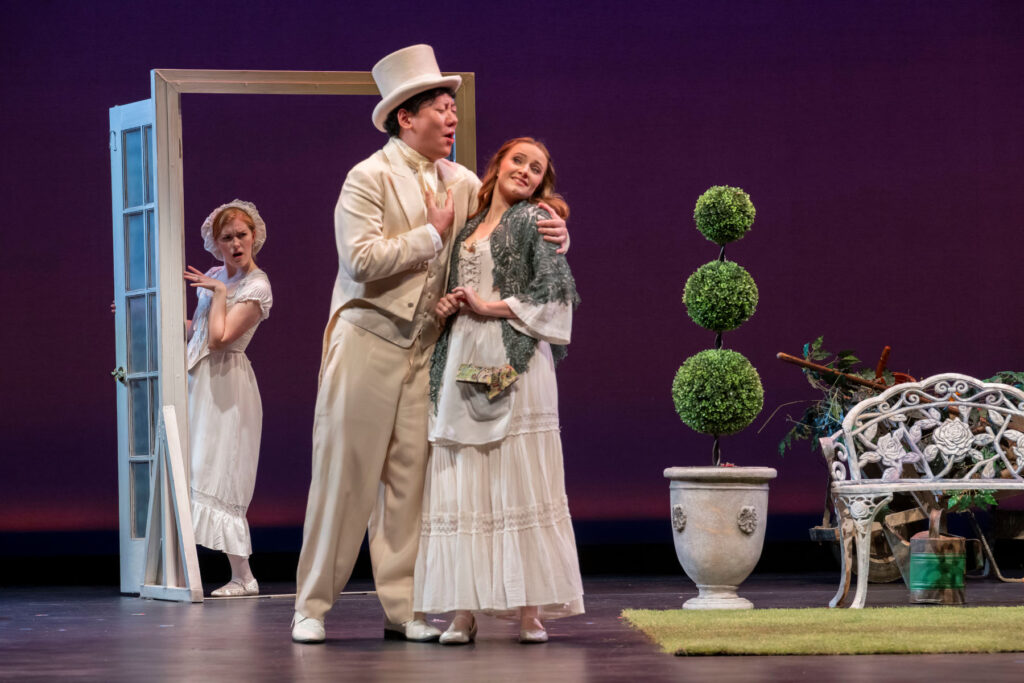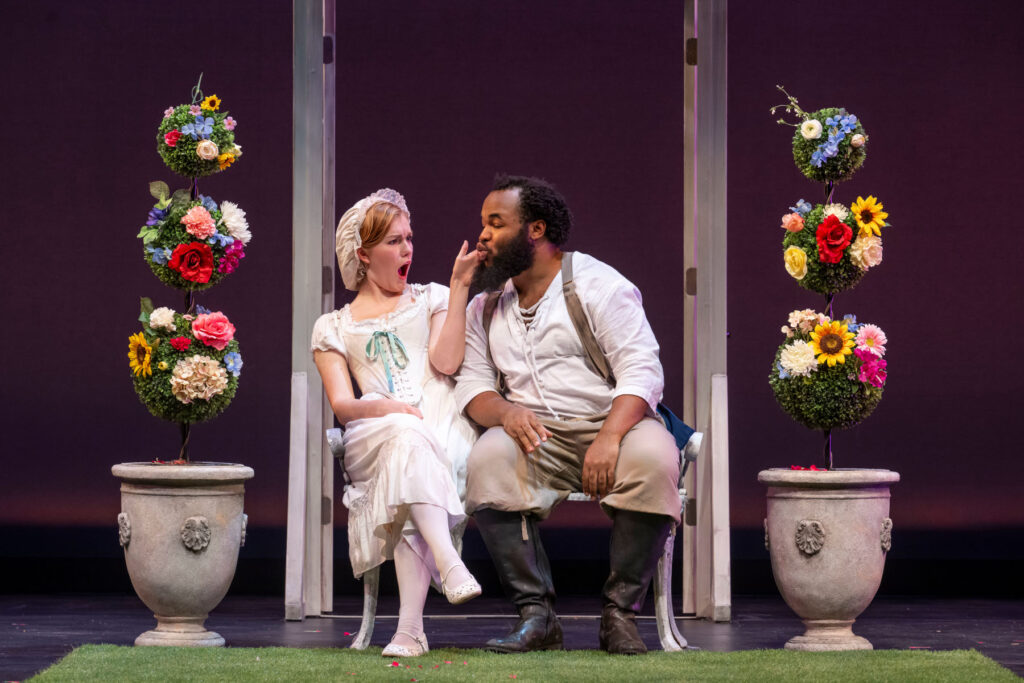Written when Mozart was only eighteen years old, it seems fitting that a university opera program should produce La finta giardinera. Perhaps unexpected, however, is the professional quality that student performers can bring to the table. Case in point? University of Maryland School of Music and Maryland Opera Studio’s production. I had the pleasure of taking in the preview performance, and was nothing short of impressed with everything I saw.
To begin with, conductor J. Bradley Baker did amazing work with the orchestra. The sounds they produced were gorgeous. Mozart’s score is tight and a testament to his virtuosity and heart even at that young age, and, considering how exposed Mozart’s vocal writing leaves the singer, it requires an orchestra like this one that is both supportive of and sensitive to what the singers are doing. Particularly impressive in this regard was the continuo during recitatives. At the same time, La finta has a long Act II finale that turns into Act III, in which the orchestra doesn’t ever really stop playing. Kudos to them for their stamina and consistency throughout the performance.

Visually, this production was stripped-down, without flats or other set pieces that one might expect for an opera. Instead, there was a sofa, a bench, a few trees, a set of French doors, a wheelbarrow with lots of flowers and later on, some long green scarves indicating trees in the forest, with a few windows. This meant that the lighting changes by designer Hailey LaRoe were critical in indicating changes of scene and also changes of mood at times, for example between Acts II and III when the time changes from night to dawn, and the end of Belfiore and Sandrina’s descent into madness. Director Catrin Davies provided insight on this in her program notes: “In the Maryland Opera Studio tradition of a minimally produced fall production, I was able to strip away the ornate trappings and focus on what truly matters: the emotional truth beneath the madness.” Emotional, indeed, was this production, evoking both laughter and tears from the audience at appropriate moments, due in large part to the commitment each performer had to their character. This is partly why, in every respect, I see no reason why this production should not be considered on the level of professional productions.
The story centers around Sandrina, secretly the Marchioness Violante in disguise, and Belfiore, the count who loved her yet stabbed her out of jealousy and ran away, thinking he had killed her. Bailey Bower as Sandrina had an especially impressive turn during her scena at the beginning of the garden scene in Act II. Beautiful singing complete with clean coloratura, Italian diction, and a sincere portrayal of her character, which is everything one wants in a Mozart leading lady.

The show was double-cast, and the Belfiore I saw was Max Alexander Cook, a wonderful tenor. I loved how he filled the musical space at the top of his first Act II aria “Care pupille.” There was a long introduction, and it didn’t feel too long because just the right amount of staging was added, thanks to Davies’ direction as well as Cook’s acting. Cook was well-cast with Bower as well, not only dramatically with the dynamic between the two, but also vocally. The epic duet they share in Act III toward the end of the show really allowed them to show off not only the power of their voices, but also their prowess at singing coloratura together. I never heard a moment when they were out-of-sync.
The rest of the cast was equally as solid as Belfiore and Sandrina. Alla Salakhova as Ramiro played her travesti role well, in particular displaying a wonderful mezzo-soprano chest register during her Act II aria “Dolce d’amor compagna.” Meghan Nelson as Serpetta brought solid coloratura to her role as well as just the right sassy characterization for her classic Mozart female servant role. John Solomon Collins charmed as Nardo, and had a particularly shining moment when he danced before his aria “Con un vezzo all’Italiana.” Absolutely delightful to see such music-informed staging, and actors who commit to it one hundred percent. Zhihui Pang took an endearing turn as Il Podestà. Especially memorable from him was the Act III finale, when he showed a change of attitude at the end as he’s the only one single at that point– pouty at first, then happy for Violante and Belfiore. He was also hilarious in Act II when he had his hand on Belfiore’s shoulder and Belfiore mistakes him for Violante. Finally, Addison Littlefield was appropriately haughty as Arminda, Sandrina’s rival for Belfiore’s love, going so far as to plot her death in the garden scene. Not easy to sympathize with her character, but there was a certain amount of satisfaction in the fact that she gets a juicy rage aria “Vorrei punirti indegno,” delivered with fiery characterization and vocal fireworks by Littlefield. On some level, one has to appreciate a woman willing to take action for what she wants. And ultimately, she gets a happy ending, too, without committing murder.
In summary, this was a well-directed, sung, and designed production of a rarely-produced, energetic Mozart opera that deserves more attention and should not be missed. One can only wonder why this is not seen more on our stages, both student and professional. Bravo to the students, directors, and faculty for providing this opportunity for their students to shine. They more than did justice to Mozart’s work.
Maggie Ramsey
La Finta Giardinera
Composed by Wolfgang Amadeus Mozart
Libretto by Giuseppe Petrosellini
Cast and Production Staff:
Sandrina – Bailey Bower; Arminda – Addison Littlefield; Serpetta – Meghan Nelson; Ramiro – Madison Hoerbelt, Alla Salakhova; Il Contino Belfiore – Max Alexander Cook, Douglas Culclasure; Nardo – Bryan Bennett, John Solomon Collins; Il Podestà – Zhihui Pang
Violin – Yuanju Liu, Daniela Arias; Viola – Fabio Dantas; Cello – David Agia; Bass – Michael Rittling; Oboe – Aaron Emerson, Oscar Krug; Horn – Michael Hall; Harpsichord – Guzal Isametdinova, Abigail Wilemon
Conductor – J. Bradley Baker; Director – Catrin Davies; Assistant Conductor – Andrew Samlal; Musical Preparation – Steven Bailey, Guzal Isametdinova, Abigail Wilemon; Costume Coordinator – Johanna Presby; Lighting Designer – Hailey LaRoe; Production Stage Manager – Mel Mader
Kay Theater, The Clarice Smith Performing Arts Center, College Park, MD, November 13, 2025
Top image: Bailey Bower as Sandrina.
All photos by Lisa Helfert.